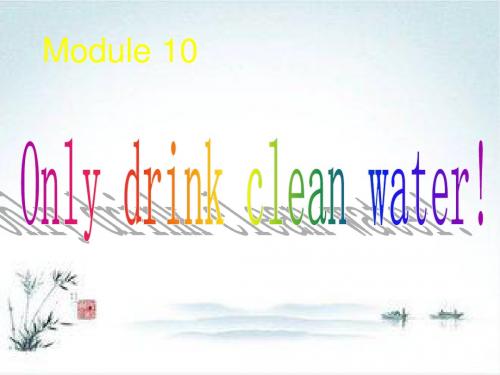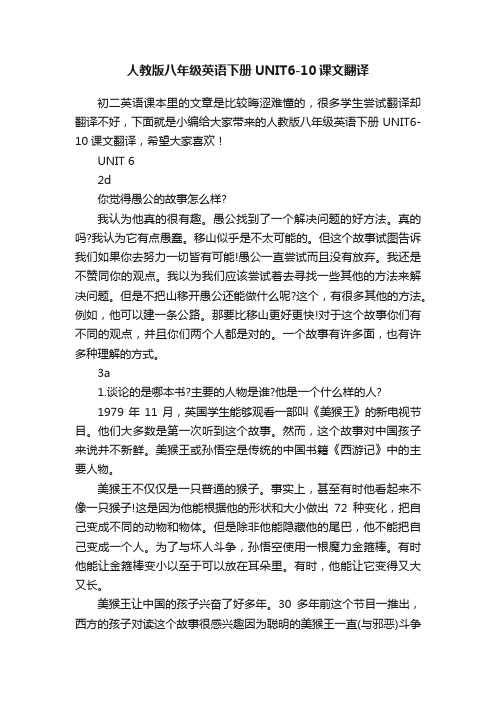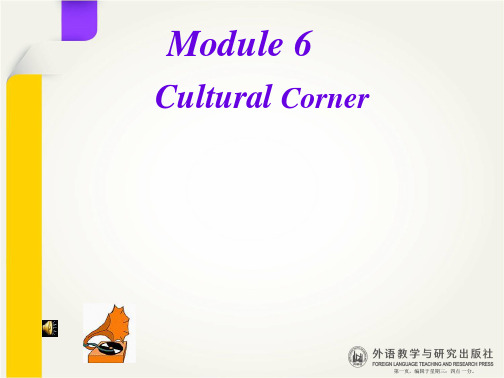新标准M6至M10课文翻译
高三M10课文翻译 江苏版译林牛津高中英语模块十

M10U1 Reading 授人以鱼1985年,埃塞俄比亚几乎没有降雨,这导致收成损毁,牛蓄死亡。
这场灾难的严重性让爱尔兰音乐家鲍勃- 格尔多夫震惊,他组织了一场名为“现场援助”的慈善音乐会,为埃塞俄比亚饥荒受难者募集资金。
1985年7月13日,音乐会在伦敦和费城两地举行,出席者包括了当时最红的巨星。
格尔多夫想通过音乐会为饥荒筹钱,并提高公众对饥荒的意识。
最后,筹集到了一亿美元,这些钱作为食品援助和饥荒救济基金发放出去。
音乐会还受到了全世界的极大关注,这给政客们施加了巨大压力,迫使他们为这次饥荒做一些事情。
埃塞俄比亚饥荒是在1985年,但对许多发展中国家的人来说,疾病和贫困仍是严重的问题。
例如,疟疾通过蚊子传播,每年都导致超过一百万的儿童的死亡。
除此以外,根据联合国的资料,饥饿和营养不良每年夺走一千万人的生命。
事实上,饥饿是全球头号健康威胁,致死的人比任何疾病都要多。
为了抗击世界各地的饥荒,联合国于1963年成立了世界粮食计划署(WFP)。
世界粮食计划署已经组织了若干项目,包括:挽救生命粮食计划——该计划为处于危机时刻的国家送去紧急粮食援助;健康成为粮食计划——它主要以身处危险中的人作为目标,例如婴儿、孕妇和老年人,并教导他们有关营养的知识;帮助失业的人们维持生计的以工贷赈计划——通过给他们工作,用事物援助支付他们的工资。
通过这样的计划,世界粮食计划署从其建立起,已经帮助了十亿多人。
勿须置疑,这是惊人的成就,但是这就足够了吗?今天,非洲、亚洲和南美洲的一些发展中国家正处于关键时刻。
当前,它们正在发展,但同样地,它们可能更远远地落后于发达国家。
它们需要帮助,但不幸的事实是仅有食物援助对帮助这些国家是不够的。
那仅仅是一个长期问题的短期解决办法。
有句俗语是这样说的:“授人以鱼,三餐之需;授人以渔,终生之用。
”如果发展中国家从进口粮食过渡到生产粮食,它们就是得到“渔”而不是“鱼”了。
发展中国家真正需要做的就是通过与贫困的根源做斗争来消灭贫困。
高三M10课文翻译 江苏版译林牛津高中英语模块十

M10U1 Reading 授人以鱼1985年,埃塞俄比亚几乎没有降雨,这导致收成损毁,牛蓄死亡。
这场灾难的严重性让爱尔兰音乐家鲍勃- 格尔多夫震惊,他组织了一场名为“现场援助”的慈善音乐会,为埃塞俄比亚饥荒受难者募集资金。
1985年7月13日,音乐会在伦敦和费城两地举行,出席者包括了当时最红的巨星。
格尔多夫想通过音乐会为饥荒筹钱,并提高公众对饥荒的意识。
最后,筹集到了一亿美元,这些钱作为食品援助和饥荒救济基金发放出去。
音乐会还受到了全世界的极大关注,这给政客们施加了巨大压力,迫使他们为这次饥荒做一些事情。
埃塞俄比亚饥荒是在1985年,但对许多发展中国家的人来说,疾病和贫困仍是严重的问题。
例如,疟疾通过蚊子传播,每年都导致超过一百万的儿童的死亡。
除此以外,根据联合国的资料,饥饿和营养不良每年夺走一千万人的生命。
事实上,饥饿是全球头号健康威胁,致死的人比任何疾病都要多。
为了抗击世界各地的饥荒,联合国于1963年成立了世界粮食计划署(WFP)。
世界粮食计划署已经组织了若干项目,包括:挽救生命粮食计划——该计划为处于危机时刻的国家送去紧急粮食援助;健康成为粮食计划——它主要以身处危险中的人作为目标,例如婴儿、孕妇和老年人,并教导他们有关营养的知识;帮助失业的人们维持生计的以工贷赈计划——通过给他们工作,用事物援助支付他们的工资。
通过这样的计划,世界粮食计划署从其建立起,已经帮助了十亿多人。
勿须置疑,这是惊人的成就,但是这就足够了吗?今天,非洲、亚洲和南美洲的一些发展中国家正处于关键时刻。
当前,它们正在发展,但同样地,它们可能更远远地落后于发达国家。
它们需要帮助,但不幸的事实是仅有食物援助对帮助这些国家是不够的。
那仅仅是一个长期问题的短期解决办法。
有句俗语是这样说的:“授人以鱼,三餐之需;授人以渔,终生之用。
”如果发展中国家从进口粮食过渡到生产粮食,它们就是得到“渔”而不是“鱼”了。
发展中国家真正需要做的就是通过与贫困的根源做斗争来消灭贫困。
新标准英语六上Module 10 Only drink clean water!

Is t fun to drink this way?
Fill in the blanks
beautiful park. They come This is a ________ hungry here ________.Simon is ________, often and Daming is ________.But Simon’s thirsty bring mum didn’t ________ any ________. drinks She ________. At last(最后),they drink forgot in the fountain(喷泉).This water is very ________. drink this fun clean It’s ________to ________. way
Module 10
Module 10
What do they want to do?
What do they bring?
Listen for the first time, try to gain the main idea of the text.
What do they bring?
2、Who is hungry? 3、Who is thirsty?
4、Did Simon’s mum bring any drinks?
They come here often. They often come here. often 频度副词, 意为“经常”。
She didn’t bring any drinks.
drink 喝 drinks 饮料 drink water
some drinks
She forgot.
人教版八年级英语下册UNIT6-10课文翻译

人教版八年级英语下册UNIT6-10课文翻译初二英语课本里的文章是比较晦涩难懂的,很多学生尝试翻译却翻译不好,下面就是小编给大家带来的人教版八年级英语下册UNIT6-10课文翻译,希望大家喜欢!UNIT 62d你觉得愚公的故事怎么样?我认为他真的很有趣。
愚公找到了一个解决问题的好方法。
真的吗?我认为它有点愚蠢。
移山似乎是不太可能的。
但这个故事试图告诉我们如果你去努力一切皆有可能!愚公一直尝试而且没有放弃。
我还是不赞同你的观点。
我以为我们应该尝试着去寻找一些其他的方法来解决问题。
但是不把山移开愚公还能做什么呢?这个,有很多其他的方法。
例如,他可以建一条公路。
那要比移山更好更快!对于这个故事你们有不同的观点,并且你们两个人都是对的。
一个故事有许多面,也有许多种理解的方式。
3a1.谈论的是哪本书?主要的人物是谁?他是一个什么样的人?1979年11月,英国学生能够观看一部叫《美猴王》的新电视节目。
他们大多数是第一次听到这个故事。
然而,这个故事对中国孩子来说并不新鲜。
美猴王或孙悟空是传统的中国书籍《西游记》中的主要人物。
美猴王不仅仅是一只普通的猴子。
事实上,甚至有时他看起来不像一只猴子!这是因为他能根据他的形状和大小做出72种变化,把自己变成不同的动物和物体。
但是除非他能隐藏他的尾巴,他不能把自己变成一个人。
为了与坏人斗争,孙悟空使用一根魔力金箍棒。
有时他能让金箍棒变小以至于可以放在耳朵里。
有时,他能让它变得又大又长。
美猴王让中国的孩子兴奋了好多年。
30多年前这个节目一推出,西方的孩子对读这个故事很感兴趣因为聪明的美猴王一直(与邪恶)斗争帮助弱者并从不放弃。
2b韩赛尔与葛雷特韩赛尔和葛雷特与他们的父亲和继母住在森林附近。
有一年,天气太干旱了以至于粮食(作物)无法生长。
妻子告诉她的丈夫如果他不把孩子们扔到森林里让他们自生自灭,整个家庭就会灭亡。
葛雷特听到了这件事,并且韩赛尔制定了一个计划来拯救自己和他的妹妹。
新标准英语第十册M6U1There are lots of stone animals.

circle
They are in a circle.
Some stones are
others.
• • • • • •
Circle circle circle. In a circle. Top top top On top of They are on top of others. They are in ,in a circle.
Why,by car,Saturday, five thousand
• I’m going to see the Stonehenge with Amy on__________.It’s a very old place. • It’s__________years old.I will see lots of big stones there.I think it may be interesting.No one knows_____people built the Stonehenge.It’s a mystery.I want to solve the mystery.We will get there______! I will take my camera and take photos.
We’ll see…
Let’s practice:
How will we get there? By ….It will take …
《英语》(新标准)(高中阶段)必修1M6 cultural corner

bored
第十八页,编辑于星期三:四点 一分。
Guess :
{Broaden horizon} “Why nt gv me a cll? Iv bn wtng fr a lng tme. I’m so sd. 〞
emoticons? 2. Do mobile phone users in China send
text message and use emoticons?
第五页,编辑于星期三:四点 一分。
New words to learn
shorten vt. [ˈʃɔ:tn] 缩短
sideways adv. ˈsaidweiz横着地, 斜着地
Module 6
Cultural Corner
第一页,编辑于星期三:四点 一分。
第二页,编辑于星期三:四点 一分。
What do we mainly use mobile phones for?
Listen to music
Text messages
calls LSisetSaerencathrocihmnifunosfroimcrmataitoionn
emoticons? 2. Do mobile phone users in China send
text message and use emoticons?
第七页,编辑于星期三:四点 一分。
1. Why do people use text messages and emoticons?
Text messages are cheaper.
We can take out “unimportant〞
letters in the words (usually vowels) and use numbers instead of words(2=to,3=free,4=for,h8=hate, etc.).
英语新标准小学一年级起始第10册Module6
《英语》(新标准)小学一年级起始第10册Module 6Module 6 Unit 1 We’ll see lots of stones.大长山小学:杨蕉宇[教学目标]1.知识目标:让学生掌握并书写单词:place circle build solve hope.理解并运用新句型:What will we see there? We’ll see lots of very big stones/…How will we get th ere? By car/…2..技能目标:在原有基础上进一步掌握一般将来时的问答并描述一个事件,为英语写作打下基础。
3..情感态度目标:1.激发学生对异国文化的兴趣,增强学生的外国文化意识。
2.为学生搭建交流平台,促进同学间的相互了解、交往,进一步提升学生的人际交往能力。
[教学重点]词汇:place, circle, build, solve, hope目标语句:What will we see there? We’ll see lots of very b ig stones.How will we get there? By car. It will take three hours.[教学难点]1.注意单词solve和mystery的发音。
2.英文写作。
[教学准备]单词卡片、录音机、教学挂图、Stonghenge图片资料(多媒体).[教学流程]一、preparation (热身活动)1.Greeing2.Free talk with teacher.“T” This summer I will go to DaLian.I will get there by ship. And then ask them “Where will you go this summer? “How will you get there?”“S1”I will ……I will get there by ……“S2”……(此环节是让学生大胆地用英语去交流,并营造一个轻松的学习英语的氛围,并为新课做铺垫.二、Presentation (介绍新语言项目)1.“T”I n London, we’ll see Big ben ,(the London eye , river Thames ) and show some pictures .Do you know what else we will see? (CAI) and ask “what’s this ? ”and teach “Stonehenge”(CAI) “What’s Stonehenge ?”It’s very old place. It’s five thousand years old . 2. On Saturday ,Amy and lingling are going to see Stonehenge. Let’s listen M6U1!(利用多媒体让学生能够有个直观的感觉去了解巨石阵,并呈现今天的学习任务)三、New teaching (课文教学)1.Listen to the tape and answer the following question:Q1: What will they see ? Q2: How will they get there? (CAI)教师提示人称变化:they ---we --- I2.Listen again and find “will” and answer“why did people build this ?”3. Read the sentences and learn new words : place ,circle , builtEg: circle we play football in a circle.4.Listen and repeat the text .( 在学习过程中,通过多媒体给学生创设情境,让他们在回答问题中去理解整篇课文,并掌握功能句和重点词)四、Production (任务完成)1.Do activity 3 on page 23 “look ,think and say ”2.Do AB exercise 2 and exercise 53.Make a survey in groups “what will you do this summer ? How will you get there ?”4. writing: Write about a trip that you will make (CAI)Eg: I will go to Dalian this summer .It is in the north of China ,I can see lots of tall buildings .I will go to Xinghai Park .I can see the sea there. I will get there by ship and car . It will take five hours .Do you like Dalian ? Will you go to Dalian ?(此环节是让学生完成大量的练习,使机械式的训练句型变得灵活并能掌握巩固新句型)六、Summary and homework (小结与作业)1."T"What did we learn this lesson?并与同学一起回顾本课所学重点目标语句,进一步强调will的使用。
六年级上册英语M6-M10
M6句子-U2
1.我们可以写关于爱 好和家人和朋友。 2.我们可以一直写电 子邮件并且一直是 朋友。 1.We can write about hobbies and families and friends. 2.We can always write emails and always be friends.
M6句子-U1
15.我有一个风筝但是我不 1.I’ve got a kite , 会放它。 but I can’t fly it. 16.我居住在纽约但是我不 2.I live in New York ,but I am not 是美国人。 American. 17.她有一封法语电子邮件 3.She’s got an email in French , but 但是她不会读它。 she can’t read it. 18.你有一封来自纽约的信 4.You’re got a letter from New York, 但是它不是来自大明。 but it’s not from Daming. 19.我有一张明信片并且它 5.I’ve got a postcard and it’s from 来自我的笔友 my pen friend.
M6词组-U2
11.在家 12.上课 13.在上午 14.在下午 15.游泳 16.骑马 17.讨论 18.用筷子 11. at home 12.have classes 13.in the morning 14.in the afternoon 15.go swimming 16.ride our horses 17.talk about e chopsticks
M6句子-U2
1.你有一副刀叉或筷子 吗? 2.你有一个中国风筝或 日本风筝吗? 3.你有关于中国或美国 的书吗? 4.你有来自中国或加拿 大的邮票吗? 5.我们不住在学校附近 所以我的妈妈在家教 我们。
新标准6年级上单词M6至M10
Module6ura['lɔ:rə]劳拉(女子名)2.world[wɜːld]世界3.difficult['dɪfɪk(ə)lt]困难的4.answer['ɑːnsə]回答5.Miss(称呼)女士6.chopsticks['tʃɒpstɪks] 筷子7.stamp[stæmp] 邮票8.poster['pəʊstə]海报,广告9.corner['kɔːnə]角落,拐角处Module71.bamboo[bæm'buː]竹子2.gave[ɡeɪv](give的过去式)给3.its[ɪts]它的4.almost['ɔːlməʊst]几乎5.deaf[def]聋的6.frightened['fraɪtnd]害怕的7.fox[fɒks]狐狸8.at night在夜晚9.hour['aʊə]小时10.d angerous['dendʒərəs] 危险的11.f antastic[fæn'tæstɪk]极好的/极出色的/不可思议的12.p resent['prez(ə)nt] 礼物13.o wl[aʊl]猫头鹰Module81.coin[kɒɪn]硬币2.ever['evə]曾经3.tidy['taɪdɪ]整齐的4.messy['mesɪ]凌乱的5.never['nevə]从不6.blackboard['blækbɔːd]黑板7.Gerry[ˈɡeri]格里(男名)8.Simon['saɪmən]西蒙(男子名)dy['leɪdɪ]女士,夫人;小姐10.c ollect[kə'lekt]收集Module91.peace [piːs]和平2.make peace维护和平3.member ['membə]成员/会员4.member state成员国5.famous['feɪməs]著名的6.important[ɪm'pɔːt(ə)nt]重要的/重大的7.mountain[ˈmaʊntən]山;山脉8.south[saʊθ]南方/南边/南部Module101.aunt[ ɑ:nt ]姑母2.forgot[ fəˈgɒt ](forget[fə'get]的过去式)忘记3.way[weɪ]方式4.cross[krɒs]穿过5.picnic['pɪknɪk](去)野餐6.thirsty['θɜːstɪ]口渴的/口干的7.sandwich['sæn(d)wɪdʒ; -wɪtʃ]三明治/夹心面包8.bring[brɪŋ]带来9.worry['wʌrɪ]担心;烦恼10.c lean[kliːn]清洁的/使干净/打扫11.s traight[streɪt]直的/笔直的12.b icycle['baɪsɪkl]自行车/骑脚踏车13.s afe[seɪf]安全的/可靠的14.t ip[tɪp]小建议/小窍门。
新标准6下M5_M10重点词句
Daming is having a birthday party. 大明正在举行生日宴会。
He is playing the suona, but the telephone rings.他正在吹唢呐,正在这时电话响了。
Some children are jumping in the water.一些孩子正在水里跳。
He is playing his favorite song and everyone is listening and clapping, but the bell rings. 他正在演奏他最喜欢的歌曲,每个人都在听着,拍着手,这个时候,门铃响了。
Now the dog is barking and dancing with the suona. 现在这只狗正随着唢呐的音乐声边叫边跳舞。
a birthday party 一个生日聚会 listen 听 dance跳舞 favourite song 最爱的歌曲play the flute 吹笛子 sleep 睡觉 carry 搬 shine 阳光 fly kites 放风筝telephone电话 , ring响, bell门铃, arrive到达, bark(狗)叫, hardly几乎不, raincoat雨衣, tunnel隧道现在分词:(注意特殊变化)clap ---- clap p ing (双写) dance ---- dancing shine ----shining (去e)Module 6It was Daming’s birthday yesterday.昨天是大明的生日。
Simon’s mum bought him a book. Simon 的妈妈给他买了一本书。
It was a book about space travel. 这是一本关于太空旅行的书。
Simon was interested in the book, too. Simon 对这本舒也很感兴趣。
- 1、下载文档前请自行甄别文档内容的完整性,平台不提供额外的编辑、内容补充、找答案等附加服务。
- 2、"仅部分预览"的文档,不可在线预览部分如存在完整性等问题,可反馈申请退款(可完整预览的文档不适用该条件!)。
- 3、如文档侵犯您的权益,请联系客服反馈,我们会尽快为您处理(人工客服工作时间:9:00-18:30)。
Module 6Unit 1 I’ve got some Chinese chopsticks .2. Listen and read . 听一听,读一读。
Lingling : Look , Amy ! A letter from the US . 看,艾米!一封来自美国的信。
Amy : Is it from Daming ? 这是大明寄来的信吗?Lingling : No , it isn’t . 不,不是。
Dear Lingling ,My name is Laura . I met Daming here in NEW York . He showed me your photo . Can you be my pen friend ?I’ve got long , yellow hair and blue eyes . I like Chinese food and I’ve got some Chinese chopsticks . But it is very diffieult for me to use them . My brother has got a Chinese kite . It is a very big bird . He often flies it in the park . I am from New York . It’s a very big city . Have you got a book about the US ? Please write back and I will answer your questions about the US .Best ,Laura亲爱的玲玲,我叫劳拉。
我在纽约遇到了大明。
向我展示了你的照片。
你可以成为我的笔友吗?我有一头长长的黄头发和一双蓝色的眼睛。
我喜欢中国的食物,我有一些中国的筷子。
但是对于我来说用起来很困难。
我的哥哥有一个中国的风筝。
这是一只非常大的鸟。
他经常在公园里放风筝。
我来自纽约。
它是一个非常大的城市。
你有一本有关美国的书吗?请回信给我,我将回答你关于美国的问题。
爱你的,劳拉Unit 2 I haven’t got a book about the US .2. Listen and read . 听一听,读一读。
Dear Laura ,Thank you for your letter . I’m happy to be your pen friend . I haven’t got a book about the US . But I have got some photos of New York with these people with the help of Miss Lin , My Art teacher . My school starts at eight o’clock . It finishes at half past three . What time does your school start and finish ?Your friend ,Lingling亲爱的劳拉,谢谢你给我的信。
我很高兴成为你的笔友。
我没有一本美国的书。
但是我有一些纽约的照片。
大明把它们寄给我的。
并且我在我的美术老师林老师的帮助下,制作了一张纽约的海报。
我的学校八点钟上课,三点半结束。
你的学校开始上课和结束是什么时间?你的朋友,玲玲4. Listen and say . Then chant . 听一听,说一说,然后反复唱一唱。
Hello , my dear friend , here is my letter . What can be better than reading a letter ? Letter or email , card or phone . We can talk together , and we’re not alone .你好,我亲爱的朋友,这是我的信。
有什么比读信更好的?信件或者电子邮件,明信片或电话。
我们可以一起说话,我们不孤单。
Module 7Unit 1 Pandas love bamboo .2. Listen , read and act out . 听一听,读一读,并表演。
Grandma : What are you watching , Daming ? 你正在看什么呢,大明?Daming : I’m watching a new DVD about animals . Sam gave it to me .我正在看一张关于动物的数字光盘,西蒙给我的。
Grandma : What does it say about my favourite animal ?关于我最喜爱的动物它都讲了些什么?Dmaning : Pandas ? 是熊猫吗?Grandma : Yes .是的。
Daming : Pandas love bamboo . They eat for twelve hours a day ?熊猫喜欢竹子。
它们每天要花12个小时吃东西!Grandma : I love bamboo too . 我也喜爱竹子。
Daming : Wow ! Look at this picture ! 哇!看这幅图!Grandma : The snake uses its body to dance . Do snakes love music ?蛇用它的身体跳舞。
蛇喜欢音乐吗?Daming : No , they don’t . They’re almost deaf ! They can’t hear the music . It says the snake thinks the flute is dangerous , so theyget frightened ?不,它们不喜欢。
它们几乎是聋的!它们听不到音乐。
上面说蛇认为笛子很危险。
并且它变得很生气!Grandma : This is a fantastic DVD . 这是一张精彩的DVD。
Daming : Yes , it’s fantastic ! 是的,它很精彩!Unit 2 A child sleeps for eight hours a night .2. Listen and read . 听一听,读一读。
A child sleeps for eight hours a night . 一个儿童一个晚上睡8个小时。
A baby sleeps for sixteen hours a day . 一个婴儿一天睡16个小时。
A fox sleeps in the day and doesn’t sleep at night .一个狐狸在白天睡觉,在晚上不睡觉。
How many hours do you sleep a night ? 你一个晚上睡多少个小时?4. Listen and say . Then chant . 看一看,说一说。
然后反复唱一唱。
This old owl , lived in a tree . He liked to look . He liked to see . He liked to hear , but not to say . We can learn a lesson from that owl today .这只年老的猫头鹰,住在树上。
它喜欢观察。
它喜欢思考。
它喜欢听,但不喜欢说。
今天我们可以从猫头鹰身上学习经验。
Module 8Unit 1 Do you often tidy your bed ?2. Listen , read and act out . 听一听,读一读并表演。
Lingling : What are you doing , Amy ? 你正在做什么,艾米?Amy : I’m tidying Tom’s bed . 我正在整理汤姆的床。
Lingling : Let me help you . 让我来帮着你吧。
Amy : Thank you . 谢谢你。
Lingling : Does he often tidy his bed ? 他经常整理他的床吗?Amy : No , he doesn’t . 不,他不经常。
Lingling : Do you often tidy your bed ? 你经常整理你的床吗?Amy : Yes , every day . I can sleep well in a tidy bed .是的,每一天都整理。
可以在一个整洁的床上好好睡觉。
Lingling : I know . Do you often tidy your desk ?我知道了。
你经常整理你的桌子吗?Amy : No , I don’t . It’s very messy . I can’t find my books .不我不经常。
它很乱。
我找不到我的书。
Lingling : I will help you , Amy . I will tidy your desk .我将帮助你,艾米。
我将整理你的桌子。
Amy : Thank you . 谢谢你。
Lingling : Now your desk is tidy . What do you want to do ?现在你的桌子整齐了。
你想干什么?Amy : Let’s read ! 让我们一起读书吧?Lingling : Good idea ! Do you often read stories ?好主意!你经常读故事书吗?Amy : Yes . I read stories every day .是的。
我读故事。
Unit 2 I often read English books .2. Listen and read . 听一听,读一读。
I never play football . I don’t likt it . 我从不踢足球。
我不喜欢它。
I sometimes clean the blackbourd for my teachers . 我有时为老师檫黑板。
I love English . I often read English books . 我喜欢英语。
我经常读英语书。
I always ride my bike to school . I never go by bus .我总是骑自行车去学校。
我从不做公共汽车去。
4. Listen and say . Then say the poem . 听一听,说一说。
